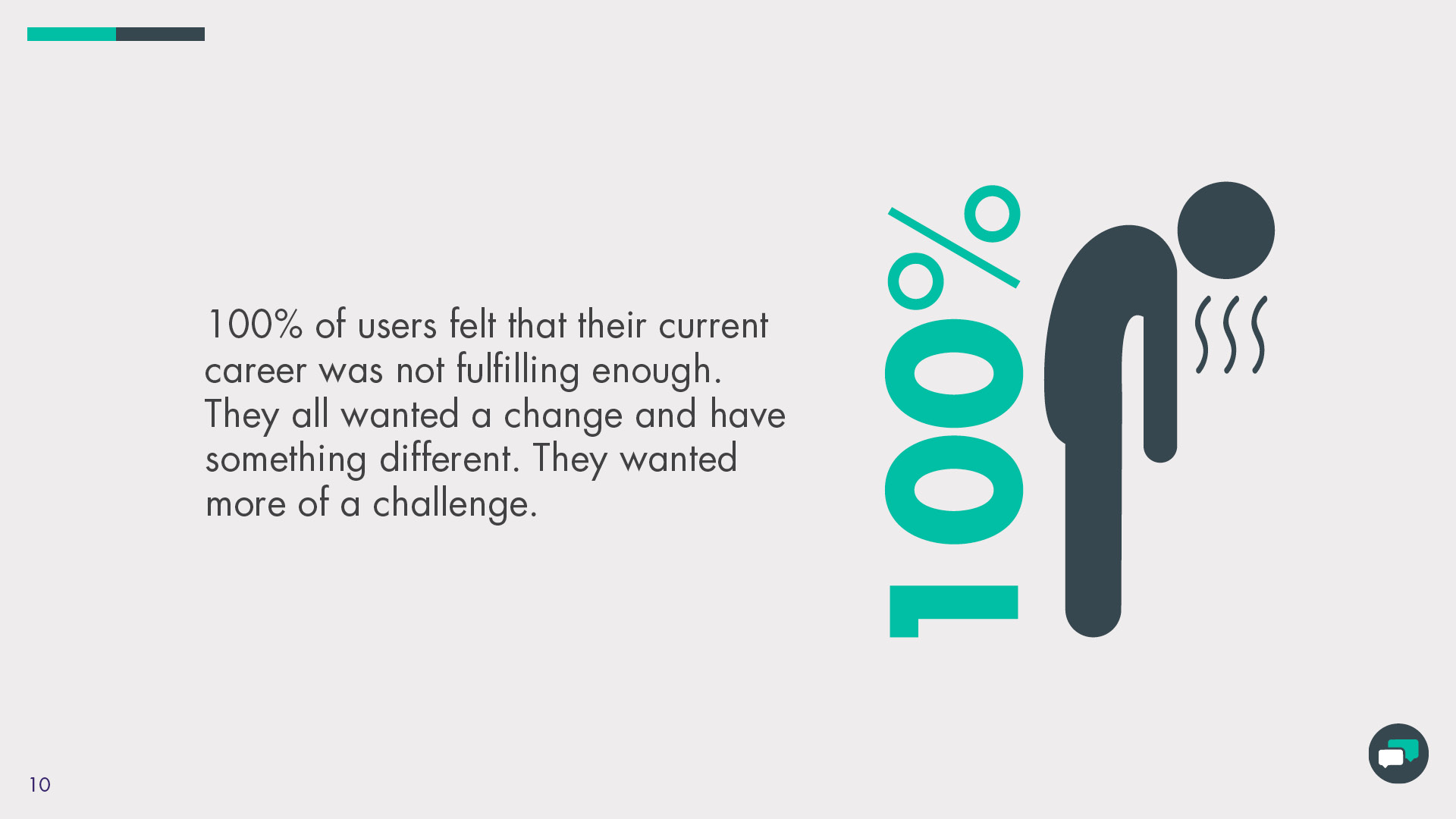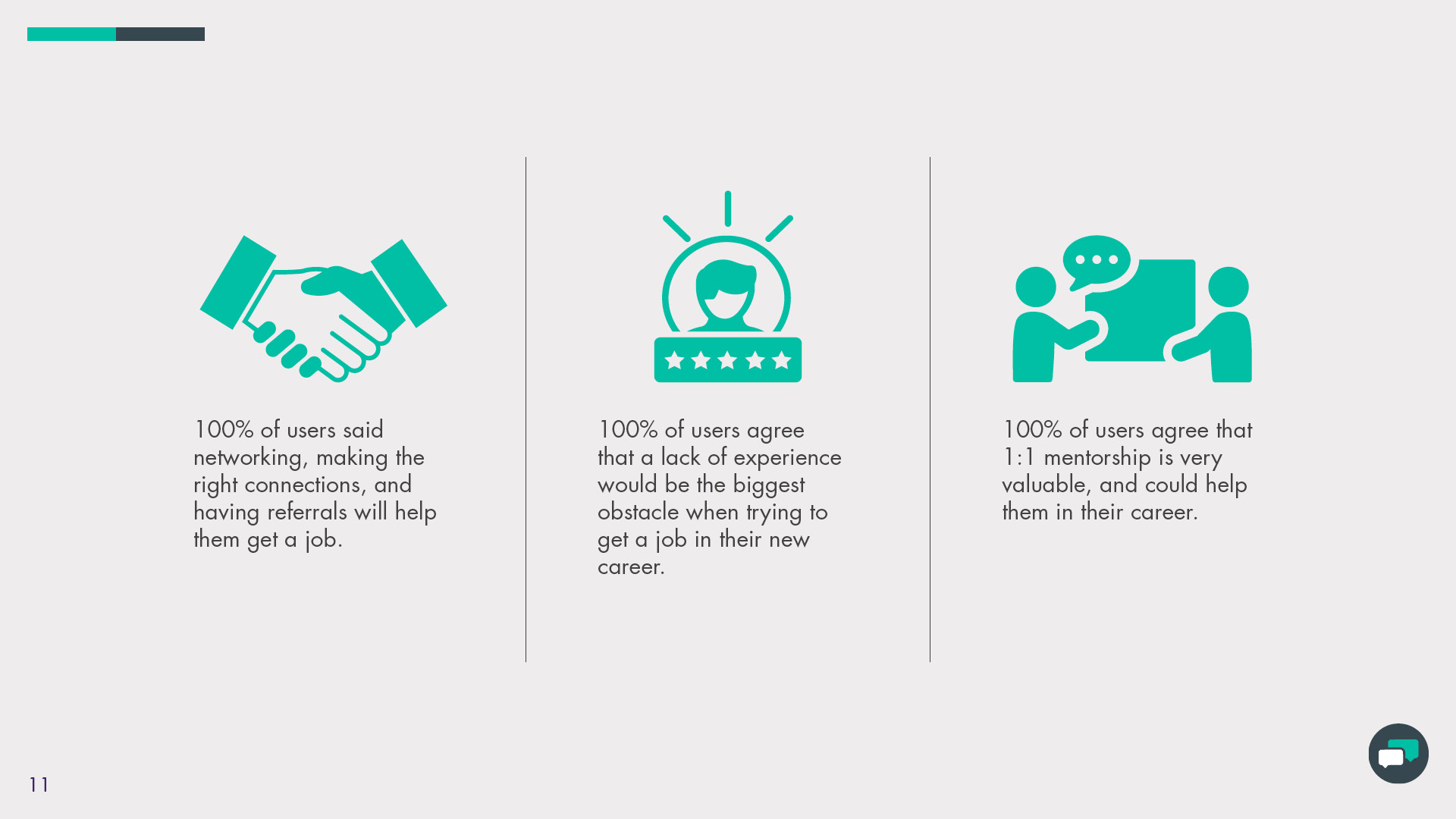
Overview
Background: Making a career change can be a challenge. Without the right support and resources, it can be impossible. This research was focused on people making a career change into the design field (e.g.) UX Design, Graphic Design, UI Design, Motion Design, UX Research, Interaction Design, and Design Leadership. Despite the many efforts by these career changers, sometimes they never get a job, or it takes a long time to reach their goals. I wanted to understand what motivates users, the kind of support and training they receive, and the connections they are making.
HMW: How might we help new designers cross over to a career in design?
Objective: Identify potential and find solutions to help overcome barriers to making a career change to the design field.
Research Questions:
What motivated users to change careers?
What type of support do users need to be successful in their new career?
What type of skills did users acquire?
How do users reach out to people in that new career?
What were users doing before making a career change?
Methodologies:
User surveys to assess demographics. User interviews (5) to understand pain points and behavior while making a career change, Usability testing (5) with low and high fidelity prototypes.
Participants:
Users in a career for five or more years
Users looking to making a change in a creative field
Recruiting Methods:
Screener Survey: Ask if participants are interested in an interview on the survey
Survey Delivery: Facebook, LinkedIn, and Slack Channels
User Research Finding:
83% of users didn’t have a job in design before moving into a design career
100% of users sought education for their new career with a Bootcamp/Cohort
50% of users took an online Bootcamp/Cohort because they needed more flexibility with time and schedule
The other 50% took an in-person Bootcamp/Cohort because it would keep them accountable and get the work done
67% of users quit their jobs to learn full-time
All users felt unfulfilled in their current career
All users said networking, making the right connections, and having referrals will help them get a job
All users agree that a lack of experience would be the biggest obstacle when trying to get a job in their new career
All users agree that 1:1 mentorship is very valuable and could help them in their career
67% of users never had or knew how to find a mentor
Artifact: Empathy Maps, Personas, Surveys, Competitive Analysis, Wireframes, Mockups
My Role: UX Designer, UX Researcher, UI Designer
My Challenges: When I started this project I was new to UX Design and Research, so there were a few challenges for me. As a former graphic designer I was programmed to jump straight to the solution. I wanted to skip all the sketches, wireframes and design those pretty mock-ups. I realize doing that will only create more problems in the long run. I had to change my way of thinking, ask more high-value questions, and remember I’m NOT THE USER.
The Process
My UX Design process is different for each project. Based on many factors such as; user needs, business goals, time, etc. Below I describe my process for solving this problem.
Research
DEFINE THE USER
Understanding the Why with User Research
To fully understand my users, I conducted 6 different interviews (3 women and 3 men) to help identify pain points, opportunities, and insights. I found patterns in answers that users gave, which helped me break down my personas into 3 types of users. To help me find these patterns I used Miro and Airtable. This allowed me to see each question and all the user answers. These personas will later help me ideate and design solutions.
Personas: Fresh Creative | Self Taught Creative | Salesman Crossover



Affinity Mapping and Question Table


WHAT OTHERS SAY
Desk Research
Before interviewing with users I wanted to understand why people change careers and challenges. After doing research here are a few of those findings.
¹The most common reasons for why it's hard to make a career change are:
Candidate Building a Network
Candidate Experience
Candidate Translation of Skills
Employer Risk
Competition
²Some of the most common reasons why people change careers are:
Money/Salary
Appreciation and Recognition
Stress
Flexible Work Options
Career Opportunities and Advancement
1 Source: 5 Career Change Obstacles You May Confront
https://www.flexjobs.com/blog/post/5-career-change-obstacles-may-confront/
2 Source: Top 5 Reasons People Change Careers
https://www.flexjobs.com/blog/post/top-5-reasons-people-change-careers/
Competitive Analysis
As a part of my Desk Research, I performed a Competitive Analysis to see what was out there already. During the analysis, I found 3 companies that helped users in different ways. Meetup – community, Behance – showing skill/experience, and Openmind – mentorship

Visual Breakdown of Data/Research Findings
Up top all the data was broken down into bullets for those who like list. For visual people here are infographics to help sell the info




Ideation
GATHER IDEAS
Potential Solutions
The research showed me how many different users there are and the many needs they all had. They all shared one common goal of making a career change with some extra help. After summarizing the information from user interviews and data analysis, it was time to sketch some solutions.
User Flow
Creating user flows helps me to understand the whole user journey and covering all the screens.

Sketches

Design
WIREFRAMES
Mid-Fidelity Wireframes
I had a list of screens to cover scenarios so I started to do blue scale wireframes to layout the flows. In this step, I also made a mid-fidelity WirePro to test the idea with users and fix the problems in the early stage.

Mid-Fidelity WirePro

MOCKUPS
High-Fidelity Mockups
Here I put some of the screens from the on-boarding, login, profile, and booking a mentor.




High-Fidelity Clickable Prototype
Testing
FINDING OPPORTUNITIES
Usability Testing
For testing, I used a task system. I found users to test with by using the survey I used from my initial user testing. I tested with 5 users, 3 men and 2 women.
I tasked users to do the following:
Register/Sign up as a Mentee
Find a Mentor
Book a Mentor Session
Test Findings
Most users wanted to know more about the mentor other than their UX Experience
All users wanted to be able to know before booking a call if the mentor would be a good fit for them
Some users wanted to see a chat feature where they could quickly ask questions without having to book a call
Most users asked how does the star rating work, and are they able to see reviews about the mentor
All users wanted to see work examples or a link to the mentor's portfolio and resume to vet them a little more
All users really liked how simple it was to book a mentor, users liked the step by step process
Some users wanted to know if they selected compare what would they be comparing
Most users were not clear on the search feature on the mentor list. Users asked what they could reach for
Recommendations
Consider adding a link to the mentors resume
Concider creating a section on the mentor's profile where mentees can see work examples
Consider allowing Mentors to upload a personalized video about themselves
Consider giving mentors the option to decide if they want to allow mentees to chat with them.
Consider using chips to allow category filters instead of a search box
Consider creating a review section on the mentor's profile so mentees can view them
Consider removing the compare feature, and add a quick view of availability
